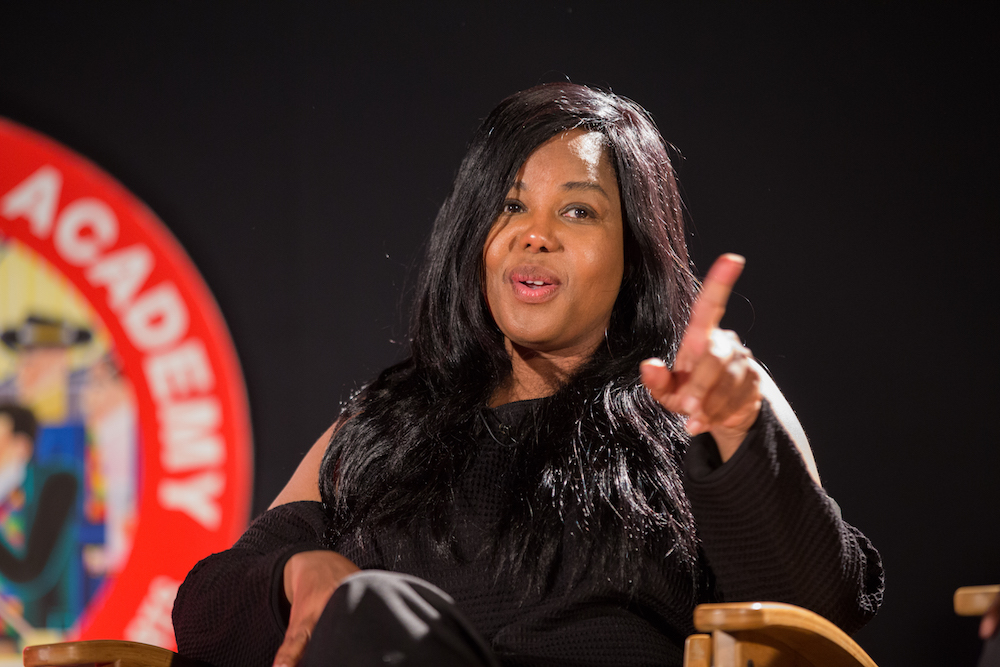On Thursday, September 28th, 2017, New York Film Academy’s Los Angeles campus celebrated women in cinema. Green Light Women, The African American and Black Film Society, and NYFA’s Women’s Club gathered to watch a screening of director Zatella Beatty’s documentary, “Iverson.”
Beatty brought along her Producer and Editor, Stephen Perry. After the screening, they participated in a Q and A hosted by ABA Advisor Kim Ogletree, ABA Film Society President Furaha Bayibsa, and Director of the Women’s Club, Vanness Hughes.
Eleven-time NBA All-Star, Allen Iverson, is a polarizing figure. Some see him as a child prodigy who honed his basketball skills and pulled himself out of insurmountable poverty. Others see a thug who embraced hip-hop culture, wore cornrows, and picked fights on the court in a decidedly unsportsmanlike manner. In the film Iverson, the ball player gets a chance to tell his story in his own words. The unflinching honesty and the nuanced struggles paint a picture of, not an icon, but rather, a human being.
The filming of this project was incredibly ambitious. It took over ten years to capture the entire story. By the end, they had well over a hundred hours of footage. Yet, this is considered par for the course in the world of documentary filmmaking. Creators frequently dedicate swathes of their life to meticulously documenting their subject, and in the case of Iverson, the basketball all-star has already developed a reputation for being a difficult subject to work with.
Iverson refused to do shoots for both the NBA and Reebok. To complicate matters, he didn’t have a typical managing team. There was no reliable way to get a hold of him. He moved with an entourage of about thirty people, consisting of friends and family members who were fiercely protective of Iverson’s privacy. Where most would see this as a deterrent, Beatty said, “I just became more and more curious.”
“Sometimes,” Beatty continued, “People would tell me they had access to Iverson. But no one could get a hold of him.” She had to purchase a ticket for a meet and greet with the 76ers and hoped she could get his attention. She described this meeting as “the red seas parting.”
The room was packed, but Iverson did not want to interact with any of the fans. By happenstance, Beatty found herself leaning against the same wall as Iverson. He asked her about her son. She didn’t know the child he was pointing to, but she was able to make a joke and pitch Iverson the movie anyway.
The next hurdle was getting film releases from the NBA. It is important to note at this point that Beatty had never made a documentary before this. She began her career in Hollywood as an actress. “By the time I was auditioning for Prostitute number twenty-seven I had just had enough. I have a degree. I knew I needed to make something myself.” A fan of basketball, she decided to pick a player and make a documentary.
Soon after that meeting, Beatty began shooting interviews with Iverson. Stephen Perry was skeptical about editing the film but Beatty needed a trailer to premiere at the NBA finals in Las Vegas. Perry would only have a month. He slapped something together and sent it off to Beatty, thinking that would be the last time he did anything with the project. But, when Beatty sent it back and said it wasn’t good enough Perry knew she was serious about the film. “Then,” Perry said, “I brought my A game.”
He needed it, too. When they finally did track Iverson down, he didn’t do a lot of speaking. But, Beatty wouldn’t be thrown from her mission. She had already done something most people thought was impossible; she had managed to get the NBA to agree to let her film during regulation gameplay. However, no one thought she would be able to do what Reebok and the NBA couldn’t, which was to get Iverson to sit down and do an interview.
“Don’t underestimate this woman. She’s like a mouse with a lion’s roar,” Perry said. Beatty financed a lot of the film out of pocket. “Sometimes we’d get a call late at night saying Iverson is flying to China in the morning,” she said. “We just had to figure it out.” She even had Perry buy hard drives. “At some point, you’re just involved,” Perry stated. “If I didn’t buy the things we needed the whole production would have stopped.”
They pushed through the difficult times, including Iverson’s jail time. Perry and Beatty erupted in laughter as they described an attempt to purchase insurance early on a Sunday morning, two minutes before they walked into the prison Iverson had spent time in as a child.
When Iverson finally saw the film, it was an emotional experience. “It’s strange to watch your entire life play out on the big screen,” Beatty said. But, when all was said and done, Iverson proclaimed that Beatty had got the story right.
If you missed this exciting event do not despair. Each month Project Green Light will partner with one of the diversity clubs at NYFA to host a documentary screening and Q&A. Be sure to follow NYFA on Facebook and Twitter for more information.
The New York Film Academy would like to thank Mr. Perry and Ms. Beatty for taking the time to speak with our students. Iverson is now available to stream on Netflix and Showtime.
